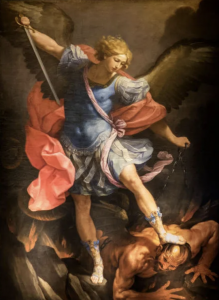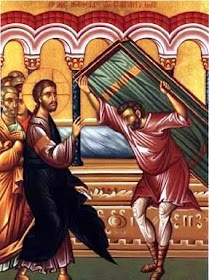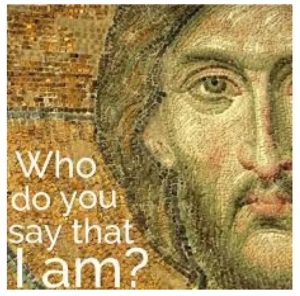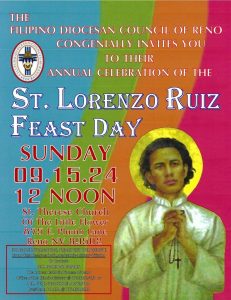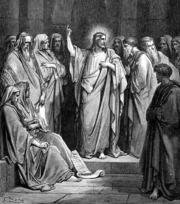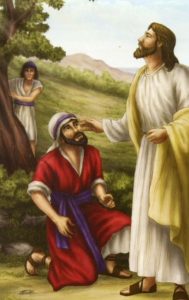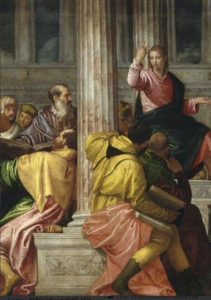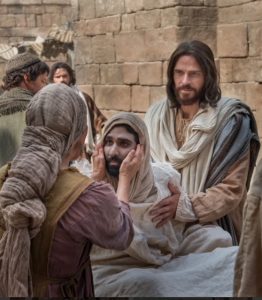- Numbers 11:25-29
- Psalm 19:8, 10, 12-13, 14
- James 5:1-6
- Mark 9:38-43, 45, 47-48
Today is the 26th Sunday in Ordinary Time, Year B. After the devastation of the Holy Spirit Mission building, caused by the Davis Creek Wildfire two weeks ago, another incident happened. On September 17, 2024, at 9:30 in the evening, I almost had a fatal vehicular accident. I was driving cautiously and crossing the intersection on a green light, when another car cut me off by turning instantly to the left, unmindful of the red light on his end. The car did not give any signal and caught me by surprise. I felt the steering wheel of my car move to my left side, evading a fatal collision. I was in shock and what came into my mind was a supernatural experience of my guardian angel protecting me from that imminent vehicular accident. I was almost there on the verge of impending death, but fortunately unharmed. I stopped in the middle of the road and was shaking. The safety belt which tightly supported the weight of my body helped, I felt the presence of God who placed me to safety. God always protects us. I realized that no matter how cautious a driver is, if other motorists don’t observe traffic rules and practice driving defensively, accidents may happen. However, I truly believe in the ever presence of God and our Holy Angels. Today, we remember the feast of the Archangels, who are always with us in moments of danger.
In the first reading from the Book of Numbers, Moses was leading the chosen people out from the desert to the promised land. The Israelites were complaining to Moses and doubting the genuine care and love of God for them. Hearing this scripture, God sent down some of the spirit that was in Moses to the 70 elders to carry the burden of the complaining people; however, two elders, Eldad and Medad, were not in attendance and had stayed at the camp. The two were prophesying. Moses asked Joshua, “Are you jealous for my sake?” This concern from Moses is a reminder that the prophetic work is for the people of the Lord. Moses encouraged them to follow and that everyone only be allowed to speak the word of God because they have received the same spirit so they might live and speak as prophets. Those who are speaking the word of God give hope and are participating in the plan of God.
The 2nd reading from the letter of James reminds us about the impending misery that wealth is corroded and can “devour your flesh like a fire.” (Jas. 5:2) It is a warning that people committing injustices towards others are increasing and alarming. Wealth must be shared with those who have less in life.
Today’s gospel from Mark narrates to us about using the name of Jesus to drive out demons. Jesus, like Moses, calmed down everything with instructions to avoid spreading the work of evil and instead to live a holy life that shines the true love of God. Here are reflective points in this gospel passage:
First, this gospel is a continuation of last week’s gospel. Jesus, holding the child, reminded his disciples not to cause the child to know what sin is to avoid scandal. This is a stern warning to those who cause sin to flourish and infect others. The real sin which gains condemnation by Jesus is that of causing others to sin, which tells a clear message of being against Jesus. Thus, it is necessary to keep ourselves attuned to Christ’s grace to learn to be virtuous. We need to be aware that it is our obligation to confront the ones who are leading others to sin, not the ones who are helping others.
Second, Jesus was notified by John that there were some using His name to expel demons. Jesus reminded His disciples that “For whoever is not against us is for us.” Jesus’ response makes us think that those who do good are welcome, and they are with Jesus because all good works come from God, who is good. Anyone doing good works and praising God is following the Lord. There is no need asking why they are doing good precisely because it reveals the very nature of God, who is mighty and loving. However, with an attitude of doing good deeds to a selective few is not the attitude and ways of Jesus.
Third, John, the apostle who has asked the question about who belongs and who does not, receives an essential teaching concerning the mission of Jesus. This is important that the power of driving out the evil spirit is only in Jesus’ name. Jesus shares this mission especially evil and demoniac deliverance for those who are attacked and possessed. In the Church, there are priests who are given the role of being exorcists. They are doing this special ministry in following the Lord to provide effective deterrent against evil infestations.
If our mission is to follow Jesus, our job is to do good works, praise God and help others. How can anyone be against Jesus by doing good works? Let us not prevent others from doing God’s goodness. Even in our own simple and little ways of sharing a cup of water to those who are thirsty, we would be doubly blest. In addition to giving a little charity to others, our body must be preserved from being cut off or thrown out if we only dedicate ourselves to refraining from bad actions that would be causing others to sin.
Let us live honorably and virtuously with a deep sense of belief that we are blest with gifts to share; thus we are meant to be sent as blessings.
God bless you.
Fr. Arlon, osa
El Dictado del Corazón
Vigésimo sexto domingo del Tiempo Ordinario, año B
- Números 11:25-29
- Salmo 19:8, 10, 12-13, 14
- Santiago 5:1-6
- Marcos 9:38-43, 45, 47-48
Hoy es el Vigésimo sexto domingo del Tiempo Ordinario, año B. Después de la devastación de la Misión del Espíritu Santo causada por el incendio forestal de Davis Creek, hace unassemanas, ocurrió otro incidente. Este pasado diecisiete de septiembre, a las nueve y treinta de la noche, casi tuve un accidente fatal. Yo iba manejando con precaución y pasando el cruce con luz verde, un carro me cortó el paso girándomeinstantáneamente a la izquierda sin prestar atención a la luz roja de su lado. El vehículo no dio ninguna señal, lo que me tomó por sorpresa. Sentí que el volante de mi auto se movía hacia mi lado izquierdo evitando una colisión fatal. Me quedé en shock y lo que vino a mi mente fue una experiencia sobrenatural de mi ángel de la guardia protegiéndome de ese inminente accidente. Estuve casi al borde de la muerte, pero afortunadamente sali, ileso. Me detuve en medio de la carretera temblando, pero el cinturón de seguridad soportaba firmemente el peso de mi cuerpo. Sentí la presencia de Dios que me puso a salvo. Dios siempre nos está protegiendo. Me di cuenta de que por más cauteloso que sea el conductor, si los demás automovilistas no observan las reglas de tránsito y practican la conducción defensiva, pueden ocurrir accidentes. Sin embargo, creo verdaderamente en la presencia constante de Dios y nuestros Santos Ángeles. Hoy recordamos la fiesta de los Arcángeles, que siempre están con nosotros en los momentos de peligro.
En la primera lectura del Libro de Números, Moisés estaba guiando al pueblo elegido desde el desierto hacia la tierra prometida. Los israelitas se quejaban con Moisés y dudaban del cuidado y amor genuinos de Dios por ellos. Al escuchar esta escritura, Dios envió algo del espíritu que estaba en Moisés a los setenta ancianos para que llevaran la carga del pueblo que no dejaba de quejarse. Sin embargo, dos ancianos que no estaban presentes, Eldad y Medad, se quedaron en el campamento. Los dos estaban profetizando. Pero Moisés le preguntó a Josué: “¿Estás celoso por mí?” Esta preocupación de Moisés es un recordatorio de que el trabajo profético es para el pueblo del Señor. Moisés los animó a seguirlo y que a todos solo se les permite hablar la palabra de Dios porque han recibido el mismo espíritu para que puedan vivir y hablar como profetas. Los que hablan la palabra de Dios dan esperanza y participan en el plan de Dios.
La segunda lectura de la carta de Santiago nos recuerda la miseria inminente que la riqueza desgasta y “devora vuestras carnes como fuego” (Stg 5,2). Es una advertencia de que las personas que cometen injusticias hacia los demás están aumentando y son alarmantes. La riqueza debe compartirse con los que son menos en la vida.
El evangelio de hoy de Marcos nos narra sobre usar el nombre de Jesús para expulsar demonios. Jesús, como lo hizo Moisés, calmó todo con instrucciones, es decir, evitar la propagación de la obra del mal y, en cambio, vivir una vida santa que resplandezca el verdadero amor de Dios. Estos son puntos de reflexión en este pasaje del evangelio:
Primero, este evangelio es una continuación del evangelio de la semana pasada. Jesús sosteniendo al niño recordó a sus discípulos que no le hicieran saber al niño lo que es el pecado, para evitar el escándalo. Esta es una advertencia severa para aquellos que hacen que el pecado florezca y así infecte a otros. El verdadero pecado que gana la condenación de Jesús es el de hacer que otros pequen, lo que da un mensaje claro de estar en contra de Jesús. Por lo tanto, es necesario mantenernos en sintonía con la gracia de Cristo para aprender a ser virtuosos. Necesitamos ser conscientes de que es nuestra obligación confrontar a los que están llevando a otros a pecar, no a los que están ayudando a otros.
En segundo lugar, Juan le notificó a Jesús que había algunos usando Su nombre para expulsar demonios. Jesús recordó a Sus discípulos que “Porque el que no está contra nosotros, está por nosotros”. La respuesta de Jesús nos hace pensar que los que hacen el bien son bienvenidos y están con Jesús porque todas las buenas obras vienen de Dios, que es bueno. Cualquiera que haga buenas obras y alabe a Dios está siguiendo al Señor. No hay necesidad de preguntar por qué hacen el bien precisamente porque eso revela la naturaleza misma de Dios, que es poderoso y amoroso. Sin embargo, una actitud de hacer buenas obras para unos pocos selectos no es la actitud ni el camino de Jesús.
En tercer lugar, Juan, el apóstol que ha hecho la pregunta sobre quién pertenece y quién no, recibe una enseñanza esencial sobre la misión de Jesús. Es importante que el poder para expulsar al espíritu maligno esté solo en el nombre de Jesús. Jesús comparte esta misión, especialmente la liberación del mal y de los demonios para aquellos que son atacados y poseídos. En la Iglesia, hay sacerdotes a quienes se les da ese papel de exorcistas. Están haciendo este ministerio especial al seguir al Señor para proporcionar un disuasivo eficaz contra las infestaciones del mal.
Si nuestra misión es seguir a Jesús, nuestro trabajo es hacer buenas obras, alabar a Dios y ayudar a los demás. ¿Cómo puede alguien estar en contra de Jesús haciendo buenas obras? No impidamos que otros hagan la bondad de Dios. Incluso en nuestras propias formas simples y pequeñas de compartir un vaso de agua con los que tienen sed, sería doblemente bendecido. Además de dar un poco de caridad a los demás, nuestro cuerpo debe ser preservado de ser cortado o arrojado a la basura si tan solo nos dedicamos a abstenernos de malas acciones que harían pecar a otros.
Vivamos de manera honorable y virtuosa con un profundo sentido de creencia de que somos bendecidos con dones para compartir, por lo tanto, estamos destinados a ser enviados como bendiciones.
Dios los bendiga.
Padre Arlon, osa


